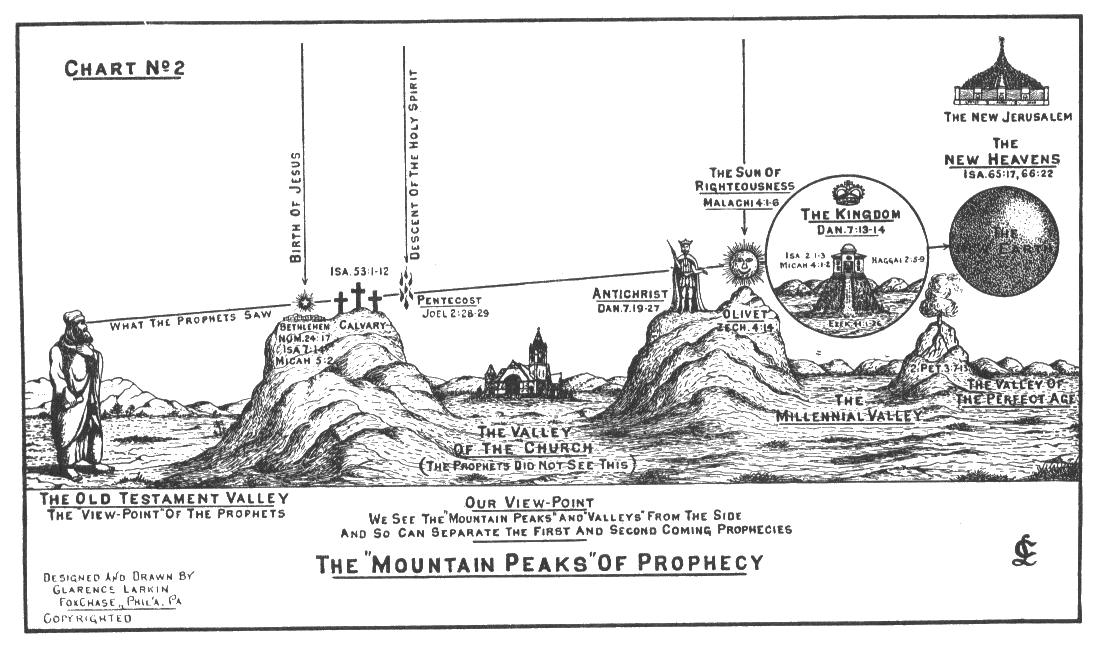 |
| Chart by Clarence Larkin, not sure what I think of it. I wouldn't have pegged him as a Baptist, but I'm not a bit surprised that he had a background in Mechanical Engineering. |
"For the Lord GOD does nothing without revealing his secret to his servants the prophets." -Amos 3:7Why does the Lord choose to reveal Himself and His plans through the prophets? Was it only during this particular period of history that he primarily spoke future plans through the prophets?
The Biblical Illustrator points back to Abraham and Noah:
Am I being biblical by de-emphasizing prophecy? There is a struggle also in the lives of Christians who become overly focused on prophecy to the point of seeing signs and visions in most every aspect of life. Again, this confuses me. Are we reading spiritual tea leaves? Why would some have this and entire denominations be without it? Has this gifting ceased? Way too many questions for this little book of Amos and the context there. However it's hard to escape these questions when you come across a verse like Amos 3:7
"The LORD said, "Shall I hide from Abraham what I am about to do," Genesis 18:17
The Lord choose to involve both Abraham and Noah in His plans, moving forward to Moses and into the era of the kingdoms.
The prophets, as a whole, are verified by the body of their work in retrospect. The Biblical Illustrator also points out that they can be confirmed independent of this through miracles. My reservation with regard to prophets of today is that they cannot be proved true in their lifetime except by miracles or other immediate evidences, and I don't see these to hold true. It seems that prophets cannot be judged in their own era--at least not in a majority way.
"God has given to different nations different missions. He has given to Rome the mission of teaching the world the meaning of law; to Greece the meaning of art and philosophy; to the Hebrew race the meaning of religion. He has given this race this message: Tell the world what you can learn of God and His relation to men. The Hebrew people have added nothing to the architecture, the art, the philosophy of life; but they have been a prophetic race—discoverers of God. In this race there were pre-eminently religious men, who saw God more clearly than their fellows, and God’s relation to mankind more clearly, and God’s relation to human events more clearly, and told their fellows what they saw. And, from all their telling, natural selection says the scientist, providence says the theologian—I say the two are the same—elected those that had in them the most vital truth, the most enduring, the most worthy to endure. Thus we have in the Old Testament something like two score of writers, the most spiritually-minded of a spiritually-minded race, telling us what they have discovered concerning God. This is the Bible. It is the gradual discovery of God in the hearts and through the tongues of prophets who were themselves members of a prophetic race." -Lyman Abbott, D. D, Biblical Illustrator
Looking forward from this era, we have the words of John in Revelation that point toward the return of Christ, and we have the words of Christ himself. We are still in the middle of things yet to come. Also, the gift of prophecy is included in the list of giftings in the New Testament which indicates that it was an active and expected gift among the early church. Is this gift still active?
We also also cautioned not to seek divination and false prophets. How to know the difference? My impulse is to avoid all manifestations entirely, to throw the entire baby out with the bathwater.
We also also cautioned not to seek divination and false prophets. How to know the difference? My impulse is to avoid all manifestations entirely, to throw the entire baby out with the bathwater.
How to discern the will of God? Is this not an individual work that each of us must accomplish in our lives to some degree?
Bob Deffinbaugh points out that the prophets help interpret the law:
Bob Deffinbaugh points out that the prophets help interpret the law:
"The prophets are to the Old Testament law what the Supreme Court is supposed to be to the laws of our land. The Supreme Court should interpret and apply the laws of our land in accordance with the intent of the framers of the Constitution of the United States. The Old Testament prophets’ task was to help God’s people interpret and apply the Old Testament law in the light of God’s purposes for giving it."We are also told to take the prophetic word to heart in the New Testament. Peter urges:
"Moreover, we possess the prophetic word as an altogether reliable thing. You do well if you pay attention to this as you would to a light shining in a murky place, until the day dawns and the morning star rises in your hearts. Above all, you do well if you recognize this: no prophecy of scripture ever comes about by the prophet’s own imagination, for no prophecy was ever borne of human impulse; rather, men carried along by the Holy Spirit spoke from God." 2 Peter 1:19-21I'll admit--I'm suspicious of modern day prophets. The ones I have known have been a bit imbalanced and undisciplined. Were the prophets of the Old Testament also imbalanced and undisciplined? I'd say no to the idea of them being undisciplined---I think of the difficulties they faced--persecution and humiliation--they were tough men, even Jonah in his running was not motivated by fear. Were they imbalanced? I would concede that many were----emotional and eccentric. I think particularly of Elijah and Elisha, but of others as well. What an odd combination come to think of it, emotional yet disciplined. The two qualities are not typically bedfellows.

No comments:
Post a Comment